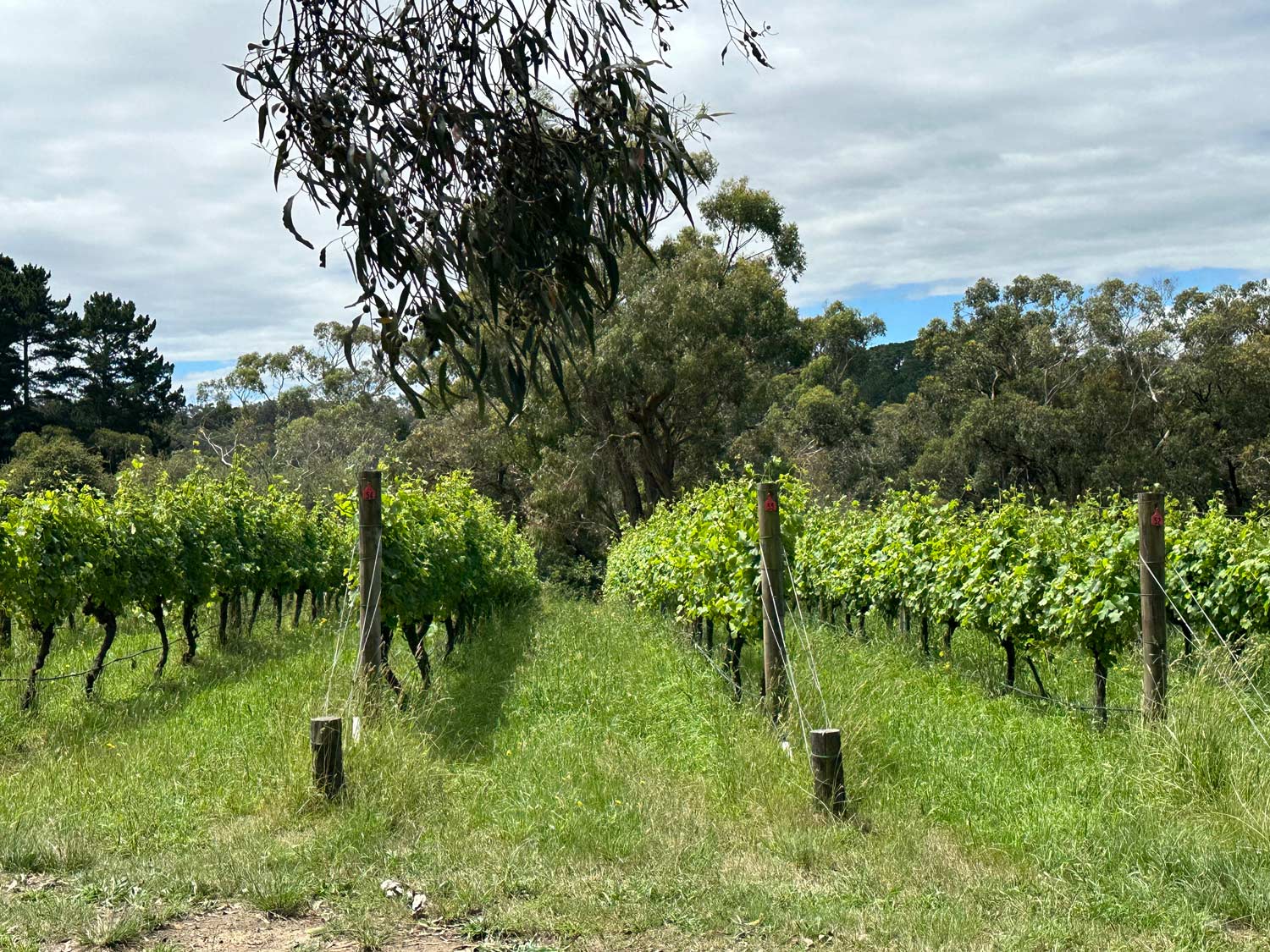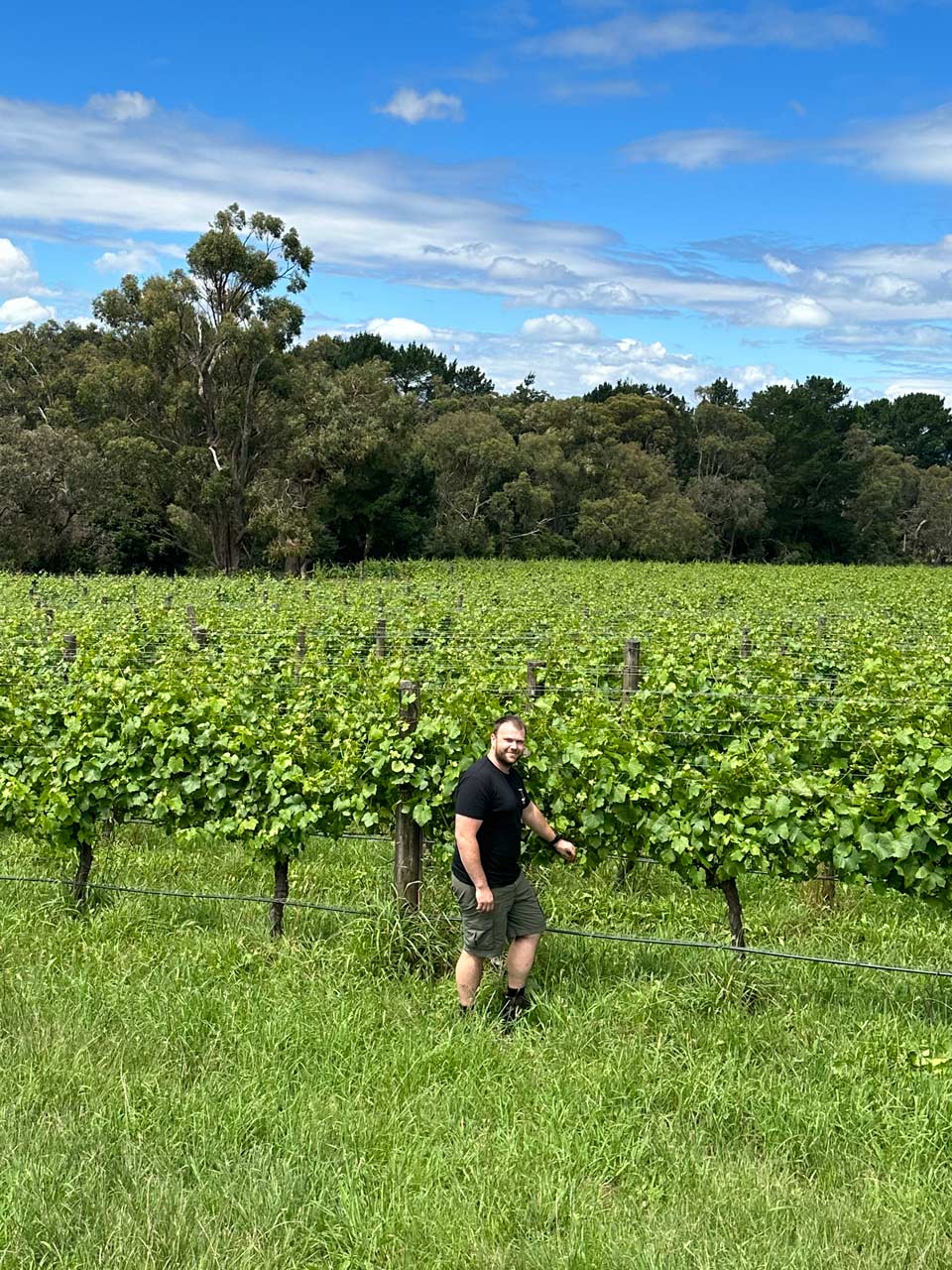In Merricks North, in the heart of Mornington Peninsula, lies Foxey’s Hangout’s Scotsworth Farm vineyard, one of the region’s pioneering biodynamic sites. Planted in 1998 by brothers Michael and Tony Lee, with viticulturist Chris Strickland taking the helm in 2016, this 2-hectare vineyard growing pinot noir and chardonnay has distinguished itself. Scotsworth Farm lays claim to being the first vineyard on the Mornington Peninsula to be biodynamically certified – achieving this status in 2019 after applying for certification in 2017. Today, Foxey’s Scotsworth Farm Chardonnay and Scotsworth Farm Pinot Noir are among the best of the varietal wines coming from the region.
“Scotsworth Farm is in Merricks North, relatively central within the Mornington Peninsula grape-growing region,” describes Strickland. “Its elevation ranges from 105 to 125 metres on a gentle north slope with north/south row orientation. Its 5 acres of vines are split between 1.5 acres of P58 clone chardonnay with 3.5 acres of MV6 clone pinot noir on VSP trellising.”
He continues, “What makes it unique is that it has been farmed organically and biodynamically since 2007 by Tony Lee, with myself taking over the viticulture program in 2016 and has been certified for both since 2019. The absence of systemic chemicals, specifically herbicides, has cultivated a rich biosphere in the vineyard, teeming with life ranging from microbial up to insectile and larger animals all being able to coexist in relative harmony from the equilibrium biodynamic farming fosters. The pinot noir block has had a long history of being a standout in the Foxeys stable, with intense perfume and earthy undertones. More recently the chardonnay from Scotsworth Farm has found its feet as a consistently high-achieving wine as well.”
Strickland shares insights into how their viticulture practices have directly translated to enhancements in wine quality. Through meticulous trials aimed at understanding and harnessing the unique characteristics of their vineyard, Strickland and his team have embarked on a journey of discovery and fine-tuning. “We love a good trial at Foxeys!”, he says. “And have done several of them over the years at the Scotsworth Farm. The ones that stand out are a pruning trial: with a control area having standard 2-cane VSP and the trial area in the neighbouring rows having a third arched cane added. When the areas were vinified separately the 3-cane ferment had deeper colour with increased intensity both aromatically and on the palate!” He continues: “The other was a defoliation trial: the control area had its east (morning side) foliage removed in the fruit zone, and the trial area had both sides of the fruit zone foliage removed. The subsequent grapes being exposed to differing amounts of sunlight. The both-side removed ferment was more intense than the control but lacked finesse, was blocky and overall tougher in the tannin profile, whereas the control was a more elegant and pretty wine.”
A large patch of native bush remains in place on in the middle fringe of the vineyard, with the vineyard planted around the existing Eucalypt trees and shrubbery giving much-needed biodiversity to the site. This helps support insect pest control by encouraging predatory insects and birds to control populations. The idea being that with a focus on equilibrium in the vineyard, the system can ‘self-manage’ itself to an extent.
“When I’m asked how we deal with a range of common vineyard ailments the answer is commonly, ‘We don’t!’. The nature of biodynamic farming results in a significantly lower number of required inputs due to the balance of the vineyard ecosystem dealing with many problems before they become economic losses: snails don’t migrate up the vine to eat shoots because there is plentiful food at ground level, LBAM (light brown apple moth) larvae don’t get to cause damage to the bunches because their population is controlled by predatory birds. The native grasses out-compete the weeds undervine. That isn’t to say there is nothing to do, for there is always plenty! Vigilance is key when you don’t have a full suite of systemic chemical controls available but many of the niggling issues are self-regulating.”
But so much of the effort that goes into growing wine cannot be seen above the ground. “The biggest challenge recently has been water management, mostly from having too much. Largely caused by the last few very wet years, some areas of Scotsworth Farm have struggled to move the water out of the vineyard, resulting in waterlogged root zones with vines struggling to take up necessary nutrients from the soil. The addition of drainage channels to redirect the excess water out of the vineyard, back into the nearby stream, has alleviated the issue.”
Strickland highlights the comprehensive approach to sustainability that extends well beyond the environmental care of their land. Strickland emphasizes the interconnectedness of ecological stewardship with the well-being of their team and the broader community, showcasing how Foxey’s Hangout integrates sustainable practices into every facet of their operation. “The other side of sustainability in the vineyard is in reducing emission outputs by limiting tractor usage and other machinery where practical. This also has an added benefit of reducing soil compaction. This necessitates the increased use of human labour in the vineyard, but this is another aspect of sustainability in our human resources. Foxeys employs 5 full-time staff and 3-4 staff casually along with a crew of vineyard labour that we have been engaging for the past 5 years.”
Strickland continues, “Foxeys endeavors to deliver a workplace that has balance. Every day we provide the staff with a morning coffee and a communal lunch at the restaurant where we can enjoy a break together over a shared meal. Along with access to group tastings and wine training in the winery, this helps create a tight-knit team of vineyard and winery staff with a shared goal of improvement… Got to love a free lunch every day!”
As one of the first (if not the first) biodynamically certified vineyards on the Mornington Peninsula, Scotsworth Farm stands as a testament to Foxey’s Hangout’s innovative spirit and unwavering dedication to producing exceptional wines that truly reflect their origin. “The results from the current biodynamic management plan at Scotsworth Farm have been threefold, the first is the improvement in biodiversity, both in and above the ground. The second is the vine health, with substantial improvement in vigour and uniformity seen throughout the vineyard. The last is the most important, the wine quality being produced. Scotsworth Farm has always been an exceptional site but over the very challenging last few years it has shown new levels of intensity and complexity in the wines being produced; when other vineyards have suffered through the last couple of seasons, Scotsworth Farm has shone brighter than ever.”




